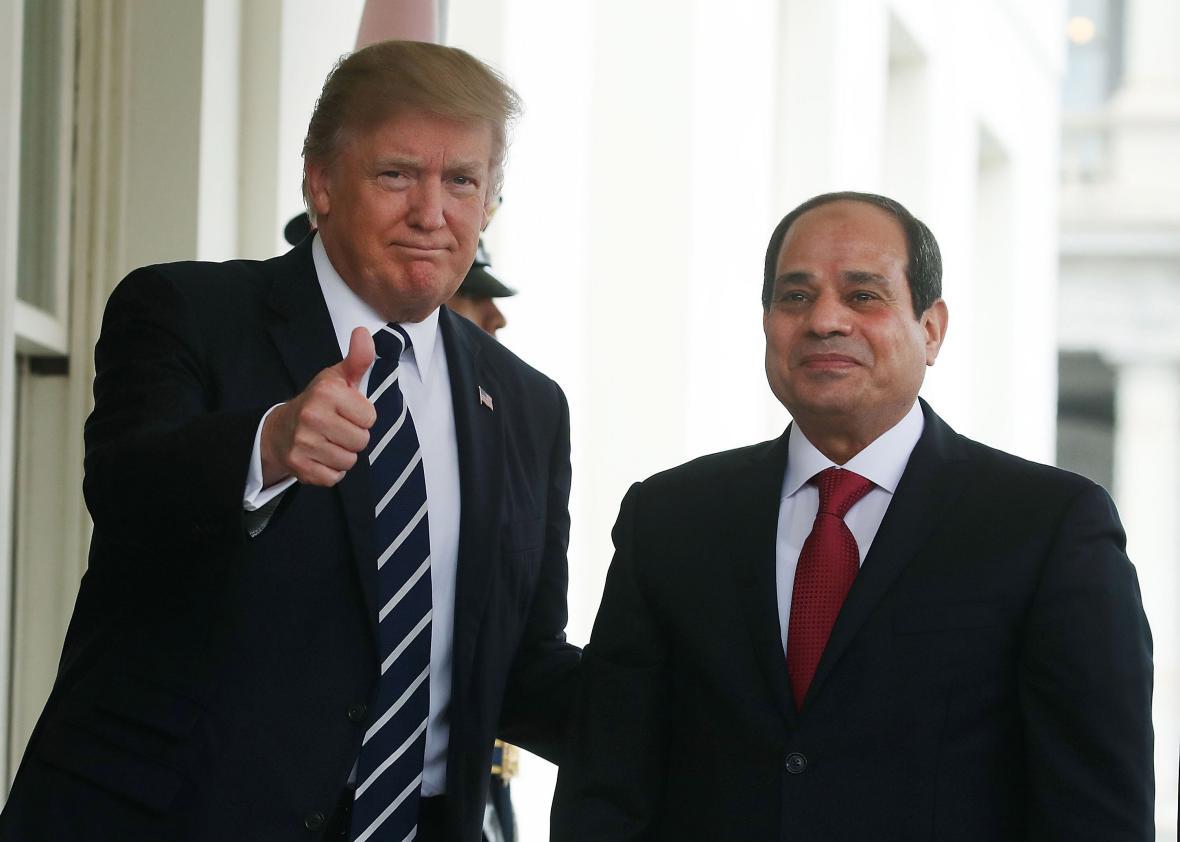There are a few things we thought we knew about the Trump administration’s Middle East policy: It is concerned first and foremost with counterterrorism, it wants to curb the influence of Iran and Islamist movements like the Muslim brotherhood, it is reflexively supportive of Israel, and it’s not particularly concerned with human rights or democracy.
So this week’s decision by the State Department to withhold $195 million in military aid to Egypt and take away $96 million in other aid, ostensibly over human rights concerns, is baffling. Egypt, unsurprisingly, has criticized the move and canceled a meeting scheduled for Wednesday between the country’s foreign minister and Jared Kushner. The State Department’s stated reason for the penalties is a recently passed Egyptian law severely restricting the activities of nongovernmental organizations. The law is terrible, and Abdel Fattah al-Sisi is undeniably a rights-abusing autocratic strongman, but since when does Trump care?
Trump has called Sisi a “fantastic guy” and at a meeting in May praised him for having “done a tremendous job under trying circumstance,” adding, “We are very much behind Egypt and the people of Egypt.”
By that point, Sisi, who took power in a military coup in 2013, had already jailed thousands of opponents and massacred hundreds of supporters of the Muslim Brotherhood. The autocratic character of the Egyptian regime was pretty clear two months ago, and it would be odd if the NGO law were the final straw.
Moreover, Secretary of State Rex Tillerson has said he doesn’t believe in conditioning U.S. cooperation on human rights standards and that doing so “creates obstacles to our ability to advance our national security interests, our economic interests.” He’s even reportedly had any mention of democracy scrubbed from the department’s mission statement. To that end, the Trump administration has resumed military aid to countries like Bahrain, suspended by the Obama administration over human rights concerns. (Obama froze aid to Egypt after the 2013 coup, but then, despite continuing to criticize Sisi’s crackdown on the Brotherhood, restored it in 2015 amid concerns over ISIS.)
It also seems like a strange time for the U.S. to pick a fight with a government that’s tacitly pro-Israel and a rival of Iran’s. Yes, Egypt is alone among Arab governments in backing Syrian President Bashar al-Assad, but the U.S. doesn’t seem to be in a hurry to oust him either, and the country’s recent forays into the war in Syria and Iraqi politics could be seen as a way to head off Iranian influence in those countries: Israel certainly sees it that way. Despite some tension last year, relations also seem to be improving again between Egypt and Saudi Arabia.
The New York Times suggests that the move may have less to do with Mideast politics than with North Korea. Egypt has had a friendly relationship with North Korea since the 1970s, and a recent U.N. report alleged that under-the-table trade in military equipment between the two countries is ongoing. The State Department hasn’t confirmed or denied that North Korea is part of its motivation, which is a little odd given that the Trump administration hasn’t exactly been shy about its other efforts to isolate Kim Jong-un.
Prior to this week’s move, it was clear that the Trump administration wanted more bang for the bucks it was sending Egypt. It has urged Egypt to do more to counter ISIS in the Sinai and wants Egypt to help form a Mideast security alliance—a sort of Arab NATO. The administration has also mused about replacing longstanding defense financing programs with loans—a major downgrade for long-standing allies like Egypt.
The latest move does seem like an effort to use some leverage in disputes with Egypt that may have little to do with the rights of NGOs in Egypt, though it’s not entirely clear what those disputes are. The Times notes that by “pausing the provision of $195 million in military funding, the Trump administration saved the money from expiring entirely on Sept. 30”—meaning that Egypt could still get the money if it changes its behavior.
There have been other recent signs that the administration is shifting away from its professed indifference to human rights. The Treasury Department sanctioned Venezuelan officials including President Nicolás Maduro after the recent disputed election and crackdown on the opposition there—possibly as a sop to members of Congress concerned about the country. And after skipping the unveiling of a global human rights report early in his tenure, Tillerson recently unveiled the agency’s annual religious freedom report which slammed allies like Turkey, Saudi Arabia, and China—a move that will gratify Christian conservatives in the United States and, in China’s case, add a bit of leverage in ongoing disputes over trade and North Korea.
It would be a surprise to see Trump lean too hard on his favorite strongmen, as long as they cooperate. But the administration does seem to be learning to play the human rights card in circumstances where doing so is beneficial—one more way its foreign policy is turning out to be surprisingly conventional.
